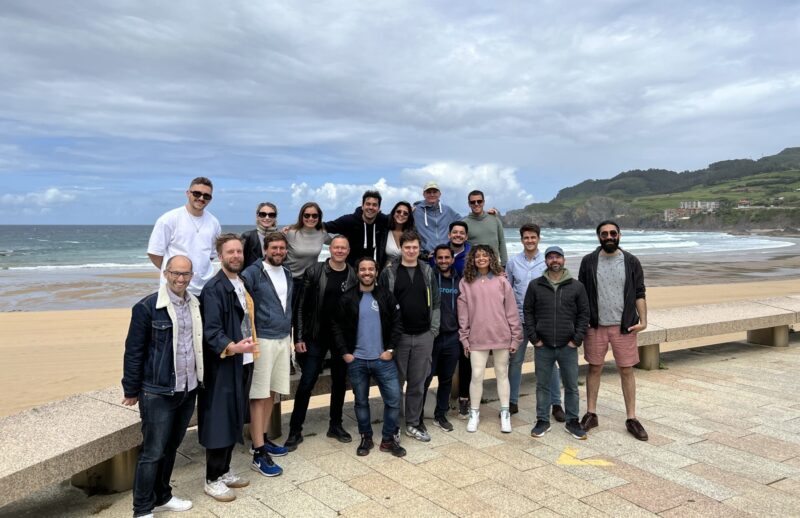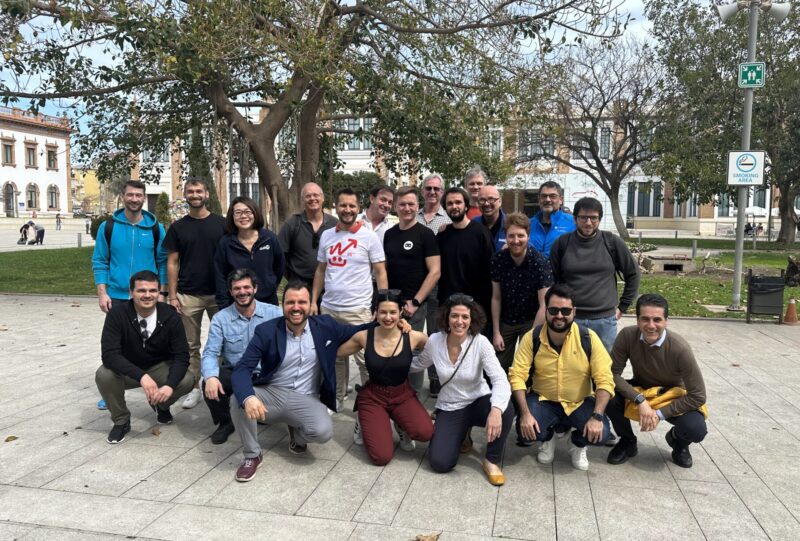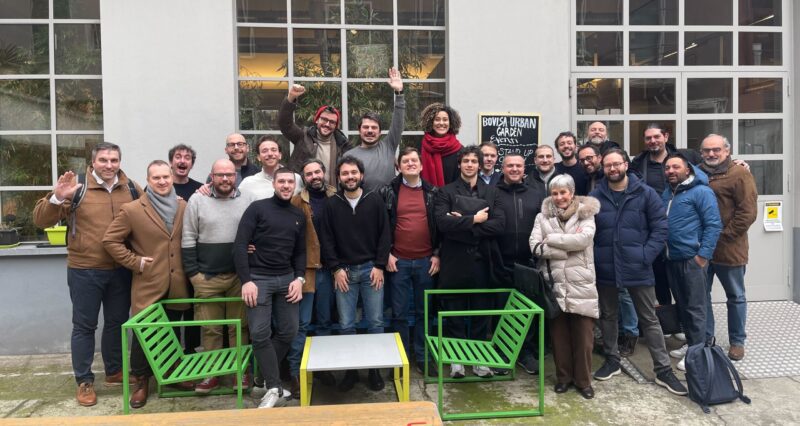A.k.a: How to achieve things on strict deadlines when working remotely with people you’ve never met
I’ve been asked to write this post because of a hackathon success at #HackTheCrisis in March 2020. I was the team lead for the winning submission, and in 48 hours we, originally a group of strangers, managed to build a fully functional project and onboard the first real users.
Kogukond Aitab was a community helpdesk hack that launched in Estonia to relieve the COVID-19 crisis by matching volunteers with people at risk. Over 2700 volunteers signed up to the helpdesk instance in the Zelos volunteer management app to deliver groceries and medicine to those who requested help. Kogukond Aitab was handed over to a local non-profit Helpific three months later when the lockdown situation was released in Estonia – my first startup exit!
Team management is my passion, so what I’m about to summarize here is a result of over 15 years of experience with remote teams and digital communication.
Hackathons are often hectic, but you don’t need to bring your own mess
Administrative work often gets treated as low-priority nuisance, something for interns or entry level positions. But in a room full of visionaries with nobody to facilitate and clean up, the result is often a visionary pile of garbage.
Johanna-Mai Riismaa
Here’s my two cents on how to win a hackathon with excellent team performance (also applicable to any type of online teamwork):
Conception
All projects start with an idea, and it is crucial that all participants understand and agree with the idea. Of course everything may and will change drastically on the way, but it’s important that everyone starts running in the same direction.
- Have a long call to kick off. An actual call, with faces and voices. Keep the conversation structured, but let everyone speak until they feel like they’ve said everything. Everyone should have a say in why are they here, what drives them, how do they want to contribute. Even if you have a very clear idea about what needs to be done, others will need their own time to process. No details need to be decided or fixed at this phase, so have the respect to listen to what everyone has to say.
- Don’t give up before you have a short summary of the problem/solution idea that everyone agrees to. Have everyone discuss. Allow people to contradict each other. Write down what is eventually being agreed on. Have multiple people explain it in their own words to make sure everyone is on the same page.
Planning
Once you have the idea written down, you should quickly switch to execution mode and be judgemental about all additional ideas that come up. Don’t introduce completely new concepts in this phase. Hope you took enough time in the conception phase so everyone got all their ideas out on time! Of course it’s OK to do idea upgrades when you learn some new information in the process, but completely changing horses on the go should be a last resort only.
Always have someone to be in charge of tasks. Ideally your team members will sign up to commitment themselves. If you ask enough times “who will do this”, someone will volunteer. Delegating left and right in a dictatorship style will not give you the same commitment.
Make sure tasks are delegated in public, so people can help each other. Having department leads is great, but what if there’s a lot more work in marketing than development? Every department always has generic tasks that don’t need specialist attention, and other team members can potentially help with these.
- Write meeting notes down so you can reference to these later. Never rely on memory – you will enjoy later having proof on what exactly everyone agreed to.
- Make notes of future tasks even if they’re not likely or relevant problems right now. Keep a board of “stuff to be solved later” so you can check every once in a while to make sure they’ve not become relevant.
- Be reasonable with expectations. What’s realistic? Don’t aim to publish an app made from scratch in a weekend, you’ll only disappoint all participants when this doesn’t happen. Use ready solutions, manual labor and some ‘duct tape’.
- Focus on proving that your idea works and is needed (functionality + traction). Nobody cares whether the website buttons are yellow or blue. Discussing these kinds of issues will eat up your valuable time and resources.
- Always agree on the upcoming milestones. When exactly is the next meeting? What are the goals everyone expects to check in at this point? Write them down in length, and share the update with the team.
- Start the next meeting with going over the milestone predictions from the previous checkpoint.
Execution
Any task management software can help keep track of who’s doing what, so pick your favorite and create a good system for following up. Online hackathons often use Slack (which is meant much more for communication than task management), so either use additional software, or be creative – here are a few tips on how to be organised on Slack:
- Force people to use threads and instantly slap everyone who’s not doing that. Every response to a message should be in a threaded reply, not a new message. Simultaneous conversations on multiple topics in one channel is the main enemy of online communication, so make sure you drill your team to adhere to a code of conduct.
- Teach everyone to tag relevant people and not ping the whole @channel about everything. If necessary, have team members identify their roles in status descriptions or screen names, so it’s easy to find the relevant target. If needed, create multiple channels for departments.
- Try to avoid private messaging between team members. Having public conversations keeps the whole team updated about the state of things, and including new people in existing conversations is much easier. It’s impossible to remember what information has been shared with everyone, and private messaging can easily leave key persons out of the loop.
- Follow up. Follow up. Follow up. Appoint one person to do administration and follow up every open thread at the end of the day (or every few hours, if needed). If a thread hasn’t come to a final resolution, the person responsible should be tagged with a question “update?” Slack lets you bookmark and flag open threads in different ways – find the option that’s most convenient for you.
- Sleep well. All-nighters aren’t good for anyone, ever.
Go to bed when you’re tired, wake up early and get back to work. Groggy people bloated on midnight pizza won’t disrupt the world.
Johanna-Mai Riismaa
Submission
Hackathons are competitions with strict deadlines. You are expected to deliver and present a result by a certain time, and it’s easy to spend more time on the delivery than presentation. But a good presentation will contribute 50% towards a successful submission. So start thinking about that early.
- Appoint people responsible for the submission from the very beginning. You can create a large part of the presentation based on the idea only.
- Preparing presentations always takes more time than you think they will. You’ll always learn that you don’t have the full skills and assets to produce exactly what you want, and multiple hours can be spent on figuring out video editing software or finding the right graphics.
- Pitches and presentations have many aspects that rely on taste and artistic values, so in order for the whole team to really sign the submission, you should circle a first draft early on. Insert placeholders so team members will understand what will be presented, and which format things will be presented in. This also helps them focus on producing the right things in the right format.
Closure
Never forget to wrap it up. It doesn’t matter whether you win or not, it doesn’t matter if the project will live on or not.
If you’ve been the team lead to bring a project to life, you need to be the responsible adult to put it to bed for the night.
Johanna-Mai Riismaa
- Get on a team call for the announcement ceremony to hear whether you won or not. Share the excitement and anticipation with each other.
- Arrange an opportunity to follow up. Agree on a personal wrap-up session a few days later once everyone’s gotten a bit of rest, or send around an anonymous feedback form. Let everyone get stuff off their chest, and ask open-ended questions. What did you learn from the experience? What would you do differently next time? What was your favorite moment?
For over a decade, Johanna-Mai Riismaa has been passionate about helping teams of volunteers to fulfill their purpose. A creative and enthusiastic go-getter, she loves tackling the unique tasks that come while giving back to the community. Johanna’s top expertise is team spirit, which is shown by her past experience mobilizing teams of over 400 volunteers. Her drive brought her to co-found Zelos, a task delegation app that makes team management easier for events and organisations. When the COVID-19 crisis struck, Johanna decided to pivot her startup towards supporting initiatives that are mobilising communities to fight the pandemic. Johanna is currently spending her days working from home, while also engaging in virtual community events regarding volunteering and civic participation.



